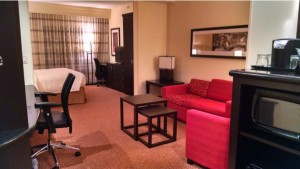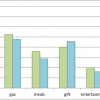A Frugal Business Trip
Last month I achieved something I’ve wanted for several months but never pulled off: a frugal trip for a speaking engagement. I minimized the costs both to me and to my host for various aspects of my travel.
First, to back up to my previous speaking trips: they were surprisingly unfrugal, at least in comparison to my typical personal travel experiences.
The costs I can’t do much about are the flight, which is a necessary large cost for in-person engagements, and the lodging, which is almost always determined by my host. (My hosts pick the seminar date and time; I do my best to book the least expensive flight available during my preferred travel times, though I try not to leave at the crack of dawn or get in past midnight.)
For one of my first speaking engagements last fall, I took Uber and cabs to and from both airports and was quite surprised at how much they added up to. I didn’t often take private cars like that before I started my business so I experienced a bit of sticker shock. My ground transportation added up to a good portion of my flight cost! Even though my host was paying for these expenses, I still didn’t feel comfortable with the cost.
I also realized that I was letting myself get pretty lax about buying convenience food while traveling, somehow justifying it in my mind as an acceptable ‘business expense.’ I would end up buying usually a couple meals per trip in airports or at my hotels, even after taking advantage of all the complimentary food available to me. Unlike my transportation expenses, I do usually pay for food out of my own funds, and I finally woke up to the fact that, yes, even though I’m getting a slight tax deduction on these expenses, it’s still real money coming out of my own pocket! I hardly ever buy convenience food during personal travel, so why was I doing it during business travel?
During my trip last week, I finally turned things around. Every trip won’t be like this one, but I thought I did a pretty good job with the costs I could control. It was a very quick trip (to the East Coast!), which helped – I was away from my house less than 36 hours.
In Seattle, I took the bus and light rail from my home to the airport ($3), and then Kyle picked me up in our car when I returned ($10.01 according to the federal mileage reimbursement). In my destination city, the university was thankfully pretty close to the airport, so my cab from the airport was $25 and my Uber to the airport was $19.77. (As a consumer, I really prefer Uber to cabs because 1) it’s always less expensive and 2) in my observation the drivers are less aggressive and I feel safer.) I walked from my hotel to the university.
I ended up not buying any food while I was traveling, which was great. I ate breakfast and lunch at home before leaving for the airport. Get this brilliant solution: I packed a couple sandwiches for dinner/a snack on my first day away! On the day of my speaking engagement/my return trip, I didn’t eat breakfast (I never feel hungry before a speaking engagement), and a boxed lunch was provided for all the attendees. Because they had leftovers, I ended up taking an extra boxed lunch, which I ate for my lunch before I left the university and my dinner on my flight. The grad student strategy of scoring free food whenever possible really paid off in this case.
I feel much better about taking these reasonable steps to reduce my and my hosts’ costs for these trips. I don’t want to be speaking to students about managing their limited stipends well while at the same time wasting money when there are simple ways to economize!
How do you minimize costs when you travel, either for business or pleasure? When you are being reimbursed for expenses, do you keep an eye on the bottom line or spend freely?
Filed under: travel · Tags: business trip


 Super-Frugal Chicago Trip
Super-Frugal Chicago Trip Running a Location-Independent Business from the Same Room Every Day
Running a Location-Independent Business from the Same Room Every Day Summer 2015 Update on My Business
Summer 2015 Update on My Business Mini-Vacation Financials: Smoky Mountains Trip for a Wedding
Mini-Vacation Financials: Smoky Mountains Trip for a Wedding


My first thoughts as I started reading were no, flights can be pretty cheap! Via travel hacking.
Now with these type of engagements where the dates aren’t flexible, airline miles are less useful. Unless you’re flying Southwest, where any flight that can be booked with cash can be booked with points. No exceptions.
I got 104k Southwest points from 2 cc’s, and am working on another 50k. Each of them require $2k spend in 3 months. And if you get 110k in a single calendar year, you can get the companion pass, which lets a companion fly with you for free every time you fly (whether you book with cash or points).
So your host chooses the specific hotel for you? That’s a little strange. Otherwise you could rack up on hotel points too.
Your blurb about tax deductions reminds me, the easiest way to explain that to people who don’t really understand taxes is it’s merely a coupon. That could be worth up to 39.6% if you make a buttload of money, but for most people is worth 10-25%.
The only time I took Uber was in LA when I had a free $20 credit for my first Uber ride. Otherwise I always take public transportation, as long as it’s running at the time and doesn’t take absurdly long (one time I got booked on an early morning flight and the metro didn’t run early enough, so I took a cab. That’s one deficiency of Uber I think. You can’t schedule rides).
When I’m being reimbursed for conference travel by my school, I still spend as if it were my own money. Because in a way, it is. It all comes out of the same pot of money that pays for my stipend.
Yeah, there is not a lot of wiggle room with the flights, and I’m definitely not interested in travel hacking to offset costs for my hosts! The next step for me in that arena would be to use the flights my hosts are paying for to generate travel rewards for my personal use, but I haven’t taken the time to figure out how to do that without increasing costs to them. (I’ve been flying several different airlines depending on what flight is least expensive.)
I think it’s typical for university visitors to be instructed to book a room at a certain hotel or given a choice among a small group of hotels. (That is, if I even book it myself in the first place. Often, my flight and/or hotel are paid directly by my host.) It’s a way for them to put a cap on the lodging costs while making sure the guest has a good and convenient experience. Sometimes the hotel is on campus or adjacent to campus so no additional transportation is necessary. I haven’t signed up for any hotel rewards programs yet, but I probably should! Mariott has started abusing my contact information…
A coupon is a good way to describe the tax deduction for business expenses. Don’t forget about SE tax on top of income tax, though! Unfortunately, food is only deductible at 50% as far as I can tell.
I often travel to or from SEA outside of the hours that public transportation is available, and if I can’t use my car a taxi is probably the only option. I haven’t looked for Ubers at 5:00 AM but I would imagine they are few and far between! It would be nice if you could request Uber rides in advance, though it would probably be less convenient for drivers than the current system. Maybe they could charge a premium for scheduled rides? I don’t know about taking public transit in my destination city, though (if available). If it were really important to my host I suppose I would try it, though I would definitely feel more comfortable with systems I’ve used in the past (DC, Boston, Atlanta).
Do you get a direct payout of unused conference/travel funds? That funding was always extra for us.
Oh I think I misunderstood. Your clients are paying for your flights. But you earn miles for flying regardless of who paid.
United and Delta are now on a revenue system. You earn miles based on how much you spend, not how far you fly. (I believe they both pay 5 miles per dollar). Whereas American still awards miles for distance flown.
I don’t know if hotels operate similarly. They might only award points if you’re actually paying.
Ah I was thinking of things like charitable and mortgage deductions when trying to dissuade notions like oh of I get a bigger house I can lower my taxes! Well yes you can but it’s still just a coupon that never reaches 100% so you’re still out more money….
Haha I kinda like using public transportation. I like seeing how it’s setup – whether it’s efficient or not. And in some cities it’s just easier. Like Atlanta if visiting Tech. When I was a prospective students they told us to take the Marta because it’s just convenient.
No theres no direct payout of unused funds, but the funding is finite. If it runs out then I won’t get paid my stipend.
I always add my frequent flyer number to my tickets when I check in for my flights so I think no matter who is paying my FF accounts are getting credit. Now if I only had a plan for what to do with the accumulated rewards. 🙂 I haven’t tried it yet but I would guess that hotels operate the same way.
Oh yeah sorry when I said how much you spent I really meant how much the ticket cost. Not if you literally were the one paying.
Sometimes it’s better to keep those miles in reserve and use them when something unexpected comes up.
Luckily, the last couple of times I’ve flown in, the city has a flat rate for taxis taking you to/from the airport and downtown. So I happily take that. The idea of Uber is both great and unnerving to me. But I’m glad it works for you.
I take advantage of any food offered, but I’m a little picky. Still, I’ll happily fill up on the appetizers/finger food than go get something myself.
When Mom and I are at FinCon, we try to find the closest grocery store (or, failing that, a drugstore) and load up on snacks for the room. That way, we’re less tempted to go out for meals. It’s especially good if there’s a grocery store nearby. Then you just get a little meat, cheese and a couple of rolls. Voila, sandwiches!
What’s unnerving to Uber about you? Yeah, leaving airports is often easier/cheaper than getting there if there are flat rates to your destination.
Gotta love the free food – especially when it’s enough for a meal even if it wasn’t billed that way! If I remember correctly, when I went to FinCon14 I didn’t pay for any food the entire time between the meals at the conference itself and the food provided by sponsors. I like having snacks/food on hand as well because if I get hungry (hangry) I’m apt to make a poor financial and nutritional choice!
Planning is really one great advice to save those pockets. Bringing some food is a good idea especially to the airport as the food there is 30% more expensive than the regular price.
Yeah, I never used to buy airport food unless it was a dire situation, but now I do it quite frequently. :/ I’m usually getting in to the East Coast quite late at night and going straight to my hotel, so I have the choice between buying airport food and going hungry or buying hotel food (not always available!), which is also quite expensive. It would be more expensive to pay for transit to and from an independent restaurant, though.
Awesome job! I always try to keep costs down when I travel for speaking engagements and conferences too, even though it is a “business expense”.
Those frugal habits are hard to shake!
I try every means just to make my trip frugal. Not only do I have a list of things to do but also have a list of meals and its budget I have to spend on especially it is not covered by the company.
You sound quite prepared for these trips!
[…] middle-class people actually use the bus system! There’s also a light rail system (I use it when I commute to the airport) that is continually expanding (two stations opened this spring!). Car2Go is also quite popular, […]